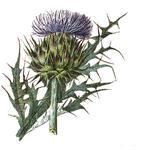Papers in the Biological Sciences

Svata M. Louda Publications
Document Type
Article
Date of this Version
2010
Abstract
Both competition and herbivory have been shown to reduce plant survival, growth, and reproduction. Much less is known about whether competition and herbivory interact in determining plant performance, especially for introduced, weedy plant species in the invaded habitat. We simultaneously evaluated both the main and interactive effects of plant neighbors and insect herbivory on rosette growth and seed reproduction in the year of flowering for Cirsium vulgare (bull thistle, spear thistle), an introduced Eurasian species, in tallgrass prairie in 2 years. Effects of insect herbivory were strong and consistent in both years, causing reduced plant growth and seed production, whereas the effects of competition with established vegetation were weak. The amount of herbivore damage inflicted on rosettes did not depend on the presence of neighbor plants. We also found no interaction between competition and herbivory on key parameters of plant growth and fitness. The results of this study contradict the hypothesis that competitive context interacts with insect herbivory in limiting the invasiveness of this introduced thistle. Further, the results provide additional, experimental evidence that high levels of herbivory on established rosettes by native insects exert significant biotic resistance to the invasiveness of C. vulgare in western tallgrass prairie.


Comments
Published in Oecologia 162 (2010), pp. 91–102; doi: 10.1007/s00442-009-1432-8 Copyright © 2009 Springer-Verlag. Used by permission.